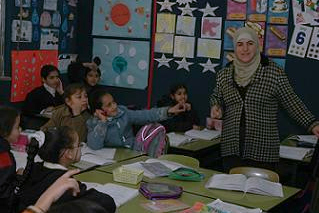 Photo by Mirah Curzer
Photo by Mirah CurzerWith the start of the new school year, nearly 90,000 Palestinian students in Jerusalem are back in class facing a deficient education system. Ahead of the school year, the Association for Civil Rights in Israel (ACRI) and Ir Amim published a detailed annual update on the state of education in East Jerusalem. The update shows that although some progress was made recently, the change has come decades too late and, for the moment, is moving too slowly.
- To download the complete report, click here.
Main issues reviewed in the report:
Classroom Shortage and Construction
Less than half of the Palestinian students in Jerusalem – 42,000 students – study in the official public schools, and 4,387 students are not registered in any school. In February 2011 the Israeli Supreme Court ruled favorably in ACRI’s petition combating the chronic shortage of 1,000 classrooms in East Jerusalem. The court ordered the State to create, within five years, a physical infrastructure to absorb all Palestinian students who wish to enroll in municipal schools. If after five years any student remains without a place in the municipal school system, the State will have to cover the tuition required by “recognized but unofficial” schools.
In the past decade, between 2001-2011, only 281 classrooms were built – 15% of the estimated shortage. According to data aquired from the authorities, 385 additional classrooms are in various stages of construction and planning procedures.
Ahead of the school year, the Jerusalem Municipality boasted that it is currently investing the sum of NIS 300 million in the planning and construction classrooms in East Jerusalem. This sum will not be provided immediately, but rather distributed over a period of several years. Given that 1,000 classrooms are lacking, it is obvious that much larger sums of money are urgently needed in order to overcome the chronic shortage within the five-year timeframe set by the Supreme Court for solving this acute problem.
Discrimination in Administrative Budget
The purpose of the administrative budgets is to cover the daily costs of the administration of educational institutions, such as electricity and water bills, photocopying, supplies, cleaning materials, and so on.
In a petition submitted last year, ACRI demanded that the authorities increase the budgets of schools in East Jerusalem to cover a NIS 10,600,000 budget gap between the budget necessary for this purpose and the budget actually given to the official Arab schools.
As a result, an additional NIS 1,500,000 were provided in the 2011 budget. In September, ACRI submitted an amended petition demanding that the court order the municipality and the Ministry of Education to reveal all of the data that led them to establish this sum and to actually budget the educational institutions in East Jerusalem according to their needs.
Discrimination in Professional Personnel Standards
In July 2011, Ir Amim and ACRI asked MANHI and the Ministry of Education to act immediately to add positions of professional personnel to East Jerusalem schools. While in the education system in West Jerusalem there were 257 educational advisers at all age levels in part-time positions, in East Jerusalem there were only 12 educational advisers at all age levels, with different levels of positions.
As for psychologists, according to a similar computation, there should be at least 28 psychologists in East Jerusalem, rather than 16 psychologists filling only 14.5 standard positions.
The state of the education system in East Jerusalem, with its physical and substantive neglect, coupled with the harsh socioeconomic background of many of the students, would justify affirmative action resulting in an even greater number of educational advisers, higher than that required by the numerical rate of students.
The Curriculum in East Jerusalem – Attempts to Change the Status Quo
After Israel annexed East Jerusalem in 1967, Arab schools in the city continued to teach the Jordanian curriculum. Later, as per the second Oslo Accords, they adopted the Palestinian Authority’s curriculum, which they have been using for the past 15 years. On June 6, Ir Amim asked the Prime Minister to block attempts to change the status quo of the past 40 years, according to which the East Jerusalem education system uses a curriculum consistent with the heritage, identity, and culture of its tens of thousands of students.
Fears of an attempt to change the status quo arose in spring 2011, when MANHI demanded for the first time that the “recognized but unofficial” schools buy textbooks exclusively through it. These textbooks, although virtually identical to those printed under Palestinian authorities, use somewhat altered political terminology. In addition, the Knesset education committee, headed by MK Alex Miller, expressed its intent to apply the Israeli curriculum in East Jerusalem.
The residents of East Jerusalem understand the attempt to impose the Israeli curriculum on them as yet another unilateral and aggressive act adding tension to life in the city and further violating their basic rights.








Pingback: Israel Zwischenzeilen « Mein Blogger